| Srl | Item |
| 1 |
ID:
100513
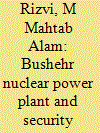

|
|
|
| 2 |
ID:
114342
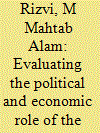

|
|
|
|
|
| Publication |
2012.
|
| Summary/Abstract |
The Islamic Revolutionary Guards Corps (IRGC) is Iran's most powerful security and military organisation, responsible for the protection and survival of the regime. Over time, the IRGC has attained a position of dominance vis-à-vis the regular army (Artesh). In due course, the Guards have also been transformed into a leading political and economic actor. The major political role of the IRGC started with the election of the reformist presidency. However, the Guards' involvement in the Iranian economy began during Rafsanjani's presidency. In view of the importance of Iran and its military, especially the IRGC, this article seeks to analyse the political and economic roles of the IRGC. The article argues that the IRGC's political and economic role is likely to increase due to its unique relationship with Iranian political elites and in view of the current power struggle between various political factions within Iran. However, any such expansion of the IRGC's role may not go unchallenged. The unintended consequence of this could be the erosion of the IRGC's credibility and people's trust.
|
|
|
|
|
|
|
|
|
|
|
|
|
|
|
|
| 3 |
ID:
117905
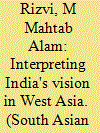

|
|
|
|
|
| Publication |
2011.
|
| Summary/Abstract |
India and Iran frequently cite the civilisational, cultural and historical ties that have bound the two countries together for more than a millennium. Both nations enjoyed strong bilateral relations following India's independence, overcoming such hindrances as Cold War politics and Iran's relationship with Pakistan. Iran and India enjoy friendly and consolidated ties that have led to greater stability in the region. The swiftly changing international surroundings and the associated strategic dimensions have been catalysts in forcing the two countries to reorient their foreign policies towards each other. However, much needs to be done to give economic and political support for a long term strategic direction to the bilateral relationship. This article seeks to capture the emerging orientation of India's relations with West Asia in general and Iran in particular. The article also examines the political, economic, cultural and security dimensions of the evolving relationship between India and Iran.
|
|
|
|
|
|
|
|
|
|
|
|
|
|
|
|
| 4 |
ID:
083926
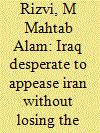

|
|
|
| 5 |
ID:
126743


|
|
|
|
|
| Publication |
New Delhi, Institute for Defence Studies and Analyses, 2013.
|
| Description |
80p.Pbk
|
| Series |
IDSA Monograph Series No.28
|
| Standard Number |
9789382169284
|
|
|
|
|
|
|
|
|
|
|
|
Copies: C:2/I:0,R:0,Q:0
Circulation
| Accession# | Call# | Current Location | Status | Policy | Location |
| 057537 | 320.955/RIZ 057537 | Main | On Shelf | General | |
| 057538 | 320.955/RIZ 057538 | Main | On Shelf | General | |
|
|
|
|
| 6 |
ID:
109812
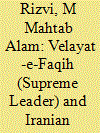

|
|
|
|
|
| Publication |
2012.
|
| Summary/Abstract |
There has been an increasing assertion of the velayat-e-faqih in Iranian politics in recent years. This has led to tensions between them and the presidential office in Iran. Against this backdrop, this article seeks to analyse the constitutional position of the velayat-e-faqih and how it has interacted with other institutions to shape Iranian foreign policy. The article critically analyses the relationship between the velayat-e-faqih and different popularly elected presidents. It concludes that this institution has been able to determine the course of Iranian foreign policy so far and will play an important role in its formulation in the future.
|
|
|
|
|
|
|
|
|
|
|
|
|
|
|
|